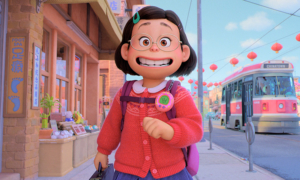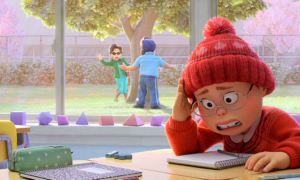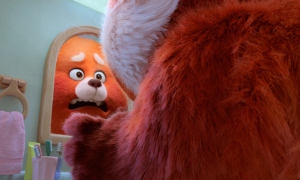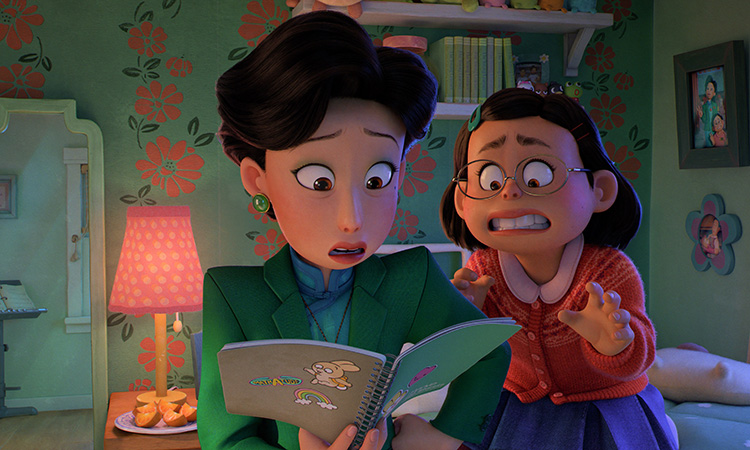Pixar movies have never been afraid to wear their beating hearts proudly on their sleeves to deal with different relationships in frank, raw ways. From a child and his beloved toy in Toy Story, to brothers and fathers in Onward, there’s sure to be a relationship, feeling or situation audiences can relate to in some ways.
For its latest movie, Turning Red, that spotlight is shining firmly on culture, friendship and the relationship between a mother and daughter during the turbulent time of puberty.
The movie tells the story of 13-year-old Mei Lee (Rosalie Chiang) who discovers an, in her words, ‘inconvenient genetic thingy’ which causes her to turn into a giant red panda every time her emotions get out of control. Soon her very carefully planned out life of top grades and fulfilling dutiful daughter duties at her parents’ temple, spiral out of control as she stops listening to what she has to do and starts doing what she wants to do, which results in a clash with her mother Ming (Sandra Oh).
“At the beginning of the movie, it’s kind of pre-coming-of-age where everything is fine. It’s probably been like that for her entire life. She’s the dutiful daughter,” Rosalie Chiang tells us who plays Mei. “People like to call Ming a tiger mum, but I know tiger mums, I don’t think she’s one. She just has rules and that’s pretty normal in any household. But they have a great relationship. She helps the temple with familial duties that Mei loves doing…”

For Ming, keeping the panda at bay is paramount (she herself has a violent past with her own panda and mother). But for a 13-year-old, keeping emotions in check is a pretty tough job and Mei not only finds difficulty in keeping the panda inside, but perhaps she doesn’t want to either…
“As the film progresses, she goes through so many changes,” Chiang continues. “Her body is changing, her relationships start changing and as she turns into a giant red panda, it starts to challenge everything in her life, especially the relationship with her mother. She learns to love her panda and love herself, when in reality, in her family, they were told to lock it away, to stay in control.”
As Mei starts to embrace her inner panda (alongside sneaking out to parties and daydreaming about boys) her relationship with her mother Ming (Sandra Oh) starts to struggle.
“It’s so freeing for Mei to let her panda out,” Chiang reveals. “That causes conflict with her mother. As the film progresses, you’ll see what happens and how that ends up…”

For Ming, Mei’s surprisingly positive relationship with her panda brings to light her own struggles with her inner panda and her relationship with her own mother (Wai Ching Ho) who, when she discovers Mei’s panda has been let out (on the national news no less), rushes down with other female members of the family to help out. Something that Ming is not keen on.
But were they all wrong to keep their pandas at bay in the first place? What they see as a curse, Mei sees as a blessing – an outlet for all those emotions she’s been locking away (it’s also pretty cute too and a brilliant money-maker from her friends at school who can’t help but adore the fluffy panda).
“I think that Mei is able to do something in the Lee dynasty, or female lineage, that Ming was not able to do and that is to accept her panda,” Sandra Oh explains. “I think that Ming is very, very proud of her daughter to be able to do something like that to make a change in that lineage.”
Speaking of lineage, Turning Red also very much focusses on culture and legacy and what that means to different families and their relationships to one another.
“[Turning Red] is about how culture grows,” Oh continues. “It’s very much exploring the idea of a young person having to break away from their family in this lens of tradition and the Chinese-Canadian culture, and the strain that puts a young person under as she is also going through puberty and the change into adolescence. It also expresses how when you are able to accept yourself, you then start defining also yourself and culture.”

For the cast of Turning Red, focusing on this relationship and this time in a young person’s life is important as the movie can be a useful tool in helping them understand and accept some of the changes they’re going through. And like any good Pixar film, Turning Red won’t just appeal and educate children, but adults alike. Hey, it’s never too late to learn is it?
“If you’re going to disappoint your parents, it’s okay,” Sandra Oh says on what she hopes audiences will take away from the movies. “If you disappoint your mum, she’ll be okay. Or she should be okay.
“Then for parents, it’s so painful to let go of our children. It’s so painful because it’s really real [but] we need to give them more space for them to develop who they really are.”
For Turning Red’s young star, who was at Mei’s very age when recording the movie, well, she just hopes audiences have fun and embrace their inner panda: “The first thing audiences should take away from this film is that they should enjoy it. It’s a good movie, it’s a good time. So fun. An emotional roller coaster!” Chiang says. “But I think audiences can take away anything from this film. We’ve talked to so many people, and they’ve all taken their own thing every time we ask them.
“But for me, the main thing is just to embrace your messiness!”
That sounds good to us! Turning Red is available now on Disney+ . Read our review here.
